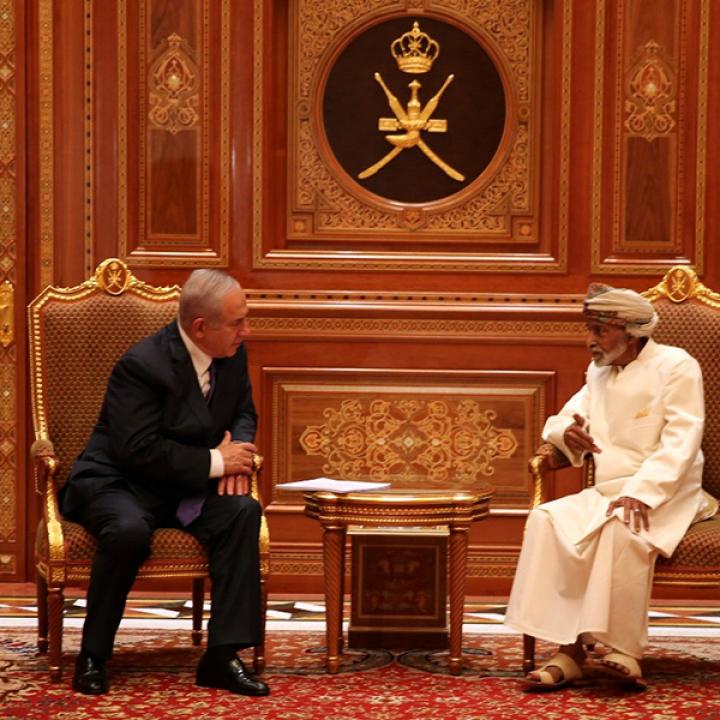

The high-profile nature of the meeting reaffirms Israel’s success in developing ties with Gulf states, as well as the independent character of Oman’s leader.
On October 25, Prime Minister Binyamin Netanyahu traveled to Oman for the first such visit by an Israeli leader in more than twenty years. According to a joint statement issued after the trip, he and Sultan Qaboos discussed “ways to advance the peace process in the Middle East, as well as several matters of joint interest regarding the achievement of peace and stability in the Middle East.”
The reference to the peace process will give Qaboos diplomatic cover from criticism elsewhere in the Arab world, building on the effect of Palestinian leader Mahmoud Abbas’s visit earlier this week. Yet the substance of the conversation may have concentrated on “deepening relations with the states of the region while leveraging Israel’s advantages in security, technology, and economic matters,” in the words of the Israeli Prime Minister’s Office.
Omani state television broadcast video of the visit on the evening news, showing the sultan, who is seventy-eight next month and has been unwell, looking spirited but frail. He introduced Netanyahu to four of his top advisors: Minister of the Royal Court Khalid al-Busaidi, Minister of the Royal Office Sultan al-Numani, Minister Responsible for Foreign Affairs Yousef bin Alawi bin Abdullah, and Head of Liaison and Coordination Munthir al-Said, whose duties center on external intelligence. Netanyahu’s delegation included Mossad chief Yossi Cohen, National Security Council head Meir Ben-Shabbat, and Foreign Ministry director Yuval Rotem.
The last such visits occurred before the turn of the century. Prime Minister Yitzhak Rabin traveled to Oman in 1994, and acting prime minister Shimon Peres hosted Yousef bin Alawi in Jerusalem a year later. In 1996, the two countries agreed to establish reciprocal trade representative offices, with Peres formally opening the one in Muscat. Although Oman closed the office after the second Palestinian intifada broke out in 2000, it continued allowing Israeli representatives to stay in the country. Undeclared intelligence and security relations between the two governments have since become very close. And as with other Gulf states, Muscat allows non-identifiable Israeli products to be sold inside Oman.
For Israel, the visit shows that Netanyahu’s regional approach is paying dividends, which could prove useful domestically if the next elections are held soon as expected. It also shows Muscat’s role as a possible back channel with Iran, perhaps relating to Syria. For Qaboos, the meeting may help deflect criticism of his relations with Tehran and his willingness to tolerate the transshipment of Iranian weapons to Houthi rebels in Yemen. In addition, it implies that Saudi Arabia and the United Arab Emirates are not the only regional routes for Israeli diplomacy. For Washington, the meeting is another good first step down the long road to reviving the peace process.
Simon Henderson is the Baker Fellow and director of the Bernstein Program on Gulf and Energy Policy at The Washington Institute. Assaf Orion, a retired Israeli brigadier general and defense strategist, is a visiting military fellow at the Institute.




